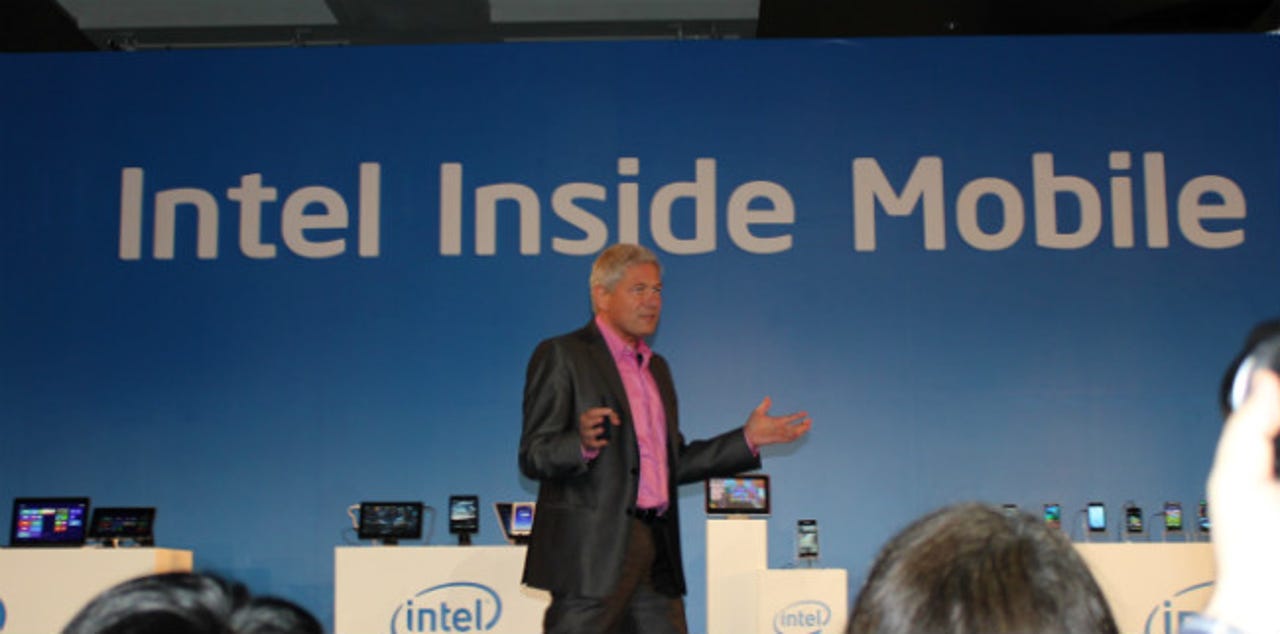Computex 2013: Intel makes case for Atom in tablets and smartphones

One day after the launch of the fourth-generation Core processors, Intel held a separate event focused on its Atom processors for tablets and smartphones. The company didn’t break any news, but Dr. Hermann Eul, head of Intel’s mobile group, explained the company’s strategy to compete with ARM and why it may finally be gaining momentum in mobile.

Eul said that Intel’s strategy is to develop “leadership products” (from entry-level to high-performance), provide complete platforms, and deliver the scale for mobile markets. “You all know that Intel can create markets,” he said. The foundation of all of this, he said, is Intel’s architecture and process technology.
After years of false starts this strategy seems to be paying off with a steady increase in the number of Intel-based tablets and smartphones in the market. And it is paying off with positive reviews. Eul said that the current Atom single- and dual-cores are very competitive with the best dual-core ARM solutions. (ARM disputed this at its own press conference earlier this week.)
Computex 2013
Intel is now shipping Clover Trail+, a dual-core processor that delivers twice the performance (three times the graphics capabilities), lower power and longer battery life than the previous generation. Lenovo’s K900 smartphone was the first device to use Clover Trail+ (the 2.0GHz Atom Z2580). The first device in the market to use Clover Trail is the with 2.0GHz Atom Z2580. Asus CEO Jerry Shen came onstage to talk about two new products, the MemoPad FHD 10 tablet and Fonepad Note FHD 6 phablet, which both use the 1.6GHz dual-core Atom Z2560 processor. Eul mentioned several other products using Atom--several of which were announced this week--including the Acer Iconia W3, Asus Transformer Book Trio, Lenovo IdeaPad Mix 10, Samsung Galaxy Tab 3 and ZTE smartphones.
Intel announced its next architecture, Silvermont, on 22nm with Tri-Gate transistors, a few weeks ago. Silvermont will be used in variety of platforms including Bay Trail for tablets and Merrifield for smartphones. It will deliver three times more peak performance or five times less power. The first Bay Trail tablets running Windows 8.1 or Android will be available by the end of the year. Eul said these will have twice the performance of the current platform, better graphics and about 8 hours of battery life. Intel demonstrated the performance of a Bay Trail tablet on video transcoding (2.5 times faster than Clover Trail) and playing a “full PC game,” Runic Games’s Torchlight 2.
On smartphones, Merrifield will deliver 50 percent better performance, longer battery life and more advanced imaging features than Intel’s current platform, Eul said. The first Merrifield smartphones will ship next year—expect lots of announcements at Mobile World Congress in February.
What’s really holding back Intel on smartphone isn’t performance, or even power; it is the lack of a global 4G LTE baseband. Intel is currently shipping a 3G baseband, the XMM 6262 and will begin shipping an LTE multimode baseband, the XMM 7160, in “coming weeks.” Eul said the chip will be smaller and use less power than competing solutions. The XMM 7160 will be used not only in smartphones, but also in tablets, 2-in-1s and standard clamshell Ultrabooks. The Galaxy Tab 3 10.1-inch tablet will use the 1.60GHz Atom Z2560 (Clover Trail+) and either the XMM 6262 or XMM 7160. Eul demonstrated both a Bay Trail tablet and an Ultrabook running on Far EasTone’s 4G LTE test network. Intel is also working on a single-chip solutions with integrated 3G and 4G modems, but it won’t comment on the timing.
Intel has yet to land a global hero phone, but its mobile business is clearly headed in the right direction. Altogether Intel’s mobile group expects to ship more than 400 million chips to customers this year, Eul said. What’s interesting is that Intel can also leverage all this mobile technology to “reinvent” PCs as well. A thin and light convertible with a Bay Trail quad-core, integrated global 4G LTE and Windows 8.1 at prices starting around $400 should be pretty compelling.